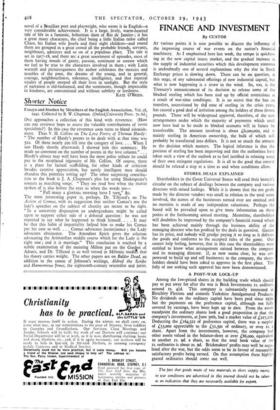FINANCE AND INVESTMENT
By CUSTOS AT various points it is now possible to discern the influence of the improving course of war events on the nation's financial machinery. As I emphasised here last week, the tempo is quicken- ing in the new capital issues market, and the gradual increase in the supply of industrial securities which this development connotes is undoubtedly one of several explanations why the rise in Stock Exchange prices is slowing down. There can be no question, at this stage, of any substantial offerings of new industrial capital, but what is now happening is a Straw in the wind. So, too, is the Treasury's announcement of its decision to release some of the blocked sterling which has been tied up by official restrictions as a result of war-time conditigns. It. is no secret that the ban on transfers, necessitated by th4 state of sterling in the crisis years, has caused a good deal of irritation among the holders of these frozen pounds. There will be widespread approval, therefore, of the new arrangements under which the majority of payments which until now have had to be made to blocked accounts will in future be transferable. The amount involved is about £6,000,000, and is mainly sterling in American ownership, the bulk of which will probably be transferred into dollars. It is not so much the amount as the decision which matters. The logical inference is that the position of sterling has been improving and that the authorities have taken such a view of the outlook as to feel justified in relaxing some of their own stringent regulations. It is all to the good that control should be relaxed a step at a time as and when conditions allow.
STORES. DEALS EXPLAINED
Shareholders in the Great Universal Stores will read their branch's circular on the subject of dealings between the company and various directors with mixed feelings. While it is shown that the net profit made by the director vendors was small in relation to the total sums involved, the names of the businesses turned over are omitted and no mention is made of any independent valuations. Perhaps the board will be prevailed upon to give more information on these points at the forthcoming annual meeting. Meantime, shareholders will doubtless be impressed by the company's financial record which has been achieved mainly through the business ability of the managing director who has profited by the deals in question, Genius has its price, and nobody will grudge paying it so long as it delivers the goods and conforms to the accepted rules of the game. One cannot help feeling, however, that in this case the shareholders were entitled to know what arrangement existed between the company and its managing director. If; as now seems clear, he was em- powered to build up and sell businesses to the company, the share- holders should have been asked to approve in the first place. The folly of not seeking such approval has now been demonstrated.
A POST-WAR LOCK-UP
Among the low-priced shares in the building trade which should pay to put away for after the war is Brick Investments is. ordinary around is. 41d. This company is substantially interested in Bletchley Flettons and controls Yorkshire Amalgamated Products. No dividends on the ordinary capital have been paid since 1939, but the payments on the preference capital, although not fully covered by earnings, have been kept up to date. From the assets standpoint the ordinary shares look a good proposition in that the company's investments, at June 3oth, had a market value of £2/7,216. Deducting the £164,322 of preference capital, there was a surplus of £53,000 appreciable to the £51,391 of ordinary, or over IS. 2 share. Apart from the investments, however, the company had other assets valued in the balance-sheet at over £86,000, ecraivalent to another is. 9d. a share, so that the total book value of the is. ordinaries is about za. 9d. Brickmakers' profits may well be regu- lated after the war, but the odds seem to be in favour of reasonably satisfactory profits being earned. On that assumption these highly- geared ordinaries should come out well.
The fact that goods made of raw materials., in short supply owing to war conditions are advertised in this journal should riot be taken as an indication that they are necessarily available for export.


























 Previous page
Previous page